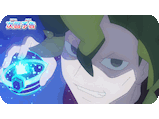
"Pockemon" for Short



Main
Old Updates Archive
Links
 |
Lists |
List of Pokemon
Pokemon World Atlas
List of Techniques
List
of Items
List of TV Episodes
 |
Guides |
Episode Comparisons
Movies
& Specials Guide
CD Guide
DVD Guide
Voice
Actors Guide
Lyrics Archive
Manga Guide
Video
Games
 |
Miscellaneous |
Humor
Pokemon Bashing
Features
Rants
Dogasu's
Backpack
| Features
| Pocket Monsters, or "Pockemon" for short


Most of us know that the word
"Pokémon" is short for the words "Pocket Monsters," right? While
these days the franchise's titular creatures are only ever referred to
as "Pokémon," there was actually a point in time when the
"Pockemon"
spelling was much more common. This article looks at how the way we
refer to the creatures has changed over the years.
In Japan the franchise is known as Poketto Monsutaa (ポケットモンスター), which is the way the words Pocket Monsters are pronounced in Japanese. In order to create the word commonly used to refer to these titular creatures, Japan took the first two phonemes from each word -- "Po" and "ke" from Poketto, and "Mo" and "n" from Monsutaa -- and put them together to make the brand new word "Pokemon" (ポ ケモン). In other words, Poketto Monsutaa becomes Pokemon.
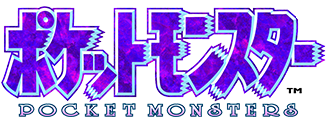
If we were to do the same thing with the English words, Pocket Monsters, we'd take take the first two phonemes from each word -- "Po" and "cke" from Pocket, and "Mo" and "n" from Monsters -- and put them together to make "Pockemon." In other words, Pocket Monsters becomes Pockemon.
And yet these days, we spell it "Pokémon" instead of "Pockemon". Why did we drop the "c"? And why is there an accent over the "e" there?
The Pocket Monsters franchise started on February 27th, 1996 in Japan and September 8th, 1998 in the U.S. That's a gap of a little over two and a half years. Accordingly, there was a significant period of time where the only time we ever saw anything related to the franchise written out in the Latin alphabet -- the alphabet we English speakers use -- was in materials straight out of Japan.
For the first few years, things were a bit inconsistent. The Pokémon Company wouldn't open its doors until April 1998, and Nintendo wasn't quite as strict about making sure everybody was following the same style guides as they are now. So companies had to make their own decisions about how to write out the series' proper names. This resulted in a variety of spellings all across the board, like "Rapurasu" instead of "Laplace" or "Nivi City" instead of "Nibi City."
This inconsistency extended to the franchise's titular creatures as well. The overwhelming majority of the products released in Japan simply opted to use "Pocket Monsters" on their packaging. It makes sense when you think about it; in Japan, the video games are Pocket Monsters Red & Green, not Pokémon Red & Green. Other products -- the TV series, various manga series, etc. -- all opt for the unabbreviated Pocket Monsters branding as well.
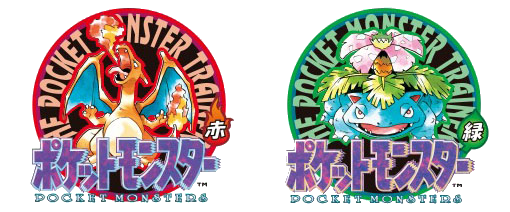
You may have noticed how the text that wraps around Lizardon and Fushigibana in the logos above says "The Pocket Monsters Trainer" instead of "Pokémon Trainer." This kind of wording was actually pretty common back in those early years. Instead of going through the headache of deciding on a way to write out the word "Pokémon" in English, companies invented alternate phrases to avoid the issue altogether.
The few products that did opt to use the word "Pokémon" in their titles decided to just say screw it, we're going to use the term "Pocket Monsters" when we write their names out in English. So for example, the Japanese text on the first Nintendo 64 game says Pokemon Sutajiamu (ポケ モンスタジアム) but the English text below it says "Pocket Monsters Stadium," not "Pokémon Stadium" as you would expect.
But then where were times when a third option was used.
Sometimes a company would feel brave and try their hand at writing the abbreviated word ポケモン out into English letters. And nine times out of ten, the spelling they chose was "Pockemon."
Below is a gallery of all the examples I've been able to find of the "Pockemon" spelling. Click on each image to view a larger version.
Elsewhere in the world, this British gaming magazine from 1998 apparently opted to use the "Pockemon" spelling. This was before the franchise would make its English language debut later that year.
Now, the "Pokemon" spelling did sometimes appear here and there during this initial two-and-a-half-year period. It wasn't as common, but it wasn't unheard of, either.
But, for the most part, the "Pockemon" spelling seems to have been much more prevalent.
The TV series, meanwhile, just kind of did its own thing. In Episode 075 "The Curtain Rises on the Pokémon League! The Water Field!," for example, the show uses both the Pokémon and the Pockemon spellings with absolutely no regard for consistency.
It is also worth noting that, during this time, we never, ever see the spelling with the accent over the "e." The "Pokémon" spelling wouldn't be seen until well after the franchise made its debut overseas.
When the franchise did eventually make its debut in the rest of the world, the "Pocket Monsters" naming got dropped entirely. You probably know this story already, but it was due to conflicts with the similarly named Monster in My Pocket. In this (archived) article posted on The Overtake, Joe Morrison, one half of the duo that created the Monster In My Pocket franchise, explains:
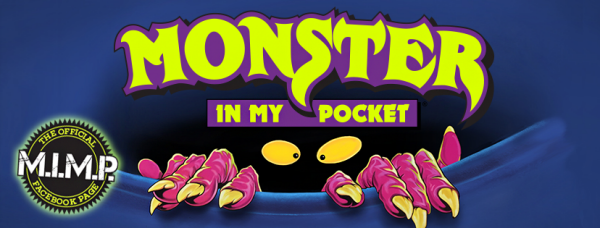
So "Pocket Monsters" was off the table. So let's go for the abbreviated version of the name, right?
So at this point you might expect them to use the spelling most common in Japan, "Pockemon." But, of course, that's not what ended up happening at all. Nintendo of America opted for "Pokémon," a brand new, never-before-seen spelling of the word that removes the "c" and replaces the "e" with an accented "é."
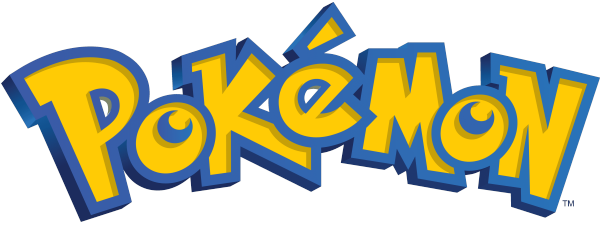
The "é" was most likely added because if it wasn't there, most non-Japanese speakers would assume that the "e" is silent and that "Pokemon" was a two syllable word. Some people ended up thinking that anyway -- I'm sure we all have stories of an older relative referring to it as Pohk-mon at some point -- but in the end the accent did help a substantial number of fans realize that the word is supposed to be three syllables and not two.
But what about the loss of the "c"? One argument against the "Pocke" spelling is the existence of the word pokke (ポッケ), an abbreviation of the word "pocket" that's often used by caretakers when talking to young children. You can also see the spelling used for a brand of Yamaha bikes from the 1980s and as the name of a monkey character on the old NHK kids' show Ittemiyou Yattemiyou. One could argue that if Pocket Monsters' titular creatures were really meant to be written "Pockemon" then the original Japanese spelling would have been ポッケ モン, not ポケモン.
On the other hand, the Japanese word for "pager" is pokeberu (ポケベル), a word that most companies wrote out as "pocket bell" despite not using either the ポケット or ポッケ spelling.
Character space considerations may have also played a role. "Pokémon" is one letter less than "Pockemon," and while a one letter savings may not sound like a lot today a single letter could make a world of difference back in the 8-bit Game Boy days.
Whatever the reason(s) may be, the Pokémon spelling is what is currently recognized as the official, correct spelling of the characters featured in the Pocket Monsters series.
Once the show made it to the West, Japan basically stopped using the "Pockemon" spelling altogether. The most recent example I could find was that CoroCoro Special insert booklet I mentioned above; from the summer of 1999 onwards, "Pokemon" took its place.
The first time I can find of Japan using the Americanized "Pokémon" (well, POKéMON) spelling was on the box art for Pokémon Pinball, a Game Boy Color game released in Japan on April 14th, 1999.
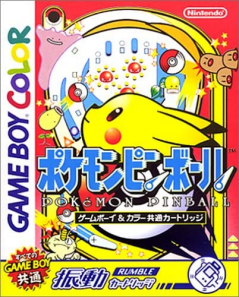
"Pokemon" and "Pokémon" would be used interchangeably for a few more years, but after a while even the "Pokemon" spelling would start to get phased out.
These days, we only ever see the Pokémon spelling in Japan. It makes a certain amount of sense; having a single name for your product in most countries makes a lot of sense, from a branding perspective. It's simpler to just have one spelling that's used throughout the world, right?
Still, it's interesting to think that there could have been a universe where the "Pockemon" spelling is the one we could have been using all these years!
| The
etymology of the word "Pokémon" |
In Japan the franchise is known as Poketto Monsutaa (ポケットモンスター), which is the way the words Pocket Monsters are pronounced in Japanese. In order to create the word commonly used to refer to these titular creatures, Japan took the first two phonemes from each word -- "Po" and "ke" from Poketto, and "Mo" and "n" from Monsutaa -- and put them together to make the brand new word "Pokemon" (ポ ケモン). In other words, Poketto Monsutaa becomes Pokemon.

If we were to do the same thing with the English words, Pocket Monsters, we'd take take the first two phonemes from each word -- "Po" and "cke" from Pocket, and "Mo" and "n" from Monsters -- and put them together to make "Pockemon." In other words, Pocket Monsters becomes Pockemon.
And yet these days, we spell it "Pokémon" instead of "Pockemon". Why did we drop the "c"? And why is there an accent over the "e" there?
| How
did Japan write the franchise's titular creatures? |
The Pocket Monsters franchise started on February 27th, 1996 in Japan and September 8th, 1998 in the U.S. That's a gap of a little over two and a half years. Accordingly, there was a significant period of time where the only time we ever saw anything related to the franchise written out in the Latin alphabet -- the alphabet we English speakers use -- was in materials straight out of Japan.
For the first few years, things were a bit inconsistent. The Pokémon Company wouldn't open its doors until April 1998, and Nintendo wasn't quite as strict about making sure everybody was following the same style guides as they are now. So companies had to make their own decisions about how to write out the series' proper names. This resulted in a variety of spellings all across the board, like "Rapurasu" instead of "Laplace" or "Nivi City" instead of "Nibi City."
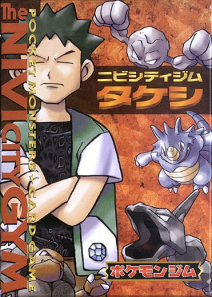 |
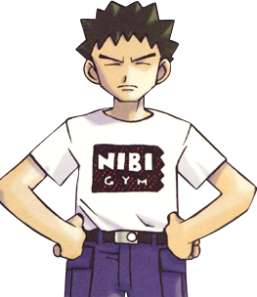 |
| Nivi Gym
(left) vs. Nibi Gym (right) |
|
This inconsistency extended to the franchise's titular creatures as well. The overwhelming majority of the products released in Japan simply opted to use "Pocket Monsters" on their packaging. It makes sense when you think about it; in Japan, the video games are Pocket Monsters Red & Green, not Pokémon Red & Green. Other products -- the TV series, various manga series, etc. -- all opt for the unabbreviated Pocket Monsters branding as well.

You may have noticed how the text that wraps around Lizardon and Fushigibana in the logos above says "The Pocket Monsters Trainer" instead of "Pokémon Trainer." This kind of wording was actually pretty common back in those early years. Instead of going through the headache of deciding on a way to write out the word "Pokémon" in English, companies invented alternate phrases to avoid the issue altogether.
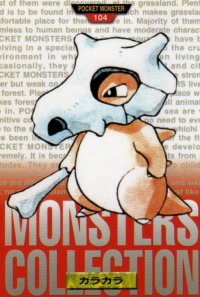 |
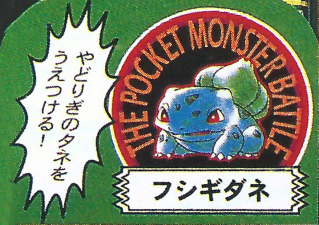 |
| A
"Monsters Collection" card from the Carddass series. |
From
the package of "Pocket Monsters BatoEn," a series of "battling pencils." |
The few products that did opt to use the word "Pokémon" in their titles decided to just say screw it, we're going to use the term "Pocket Monsters" when we write their names out in English. So for example, the Japanese text on the first Nintendo 64 game says Pokemon Sutajiamu (ポケ モンスタジアム) but the English text below it says "Pocket Monsters Stadium," not "Pokémon Stadium" as you would expect.
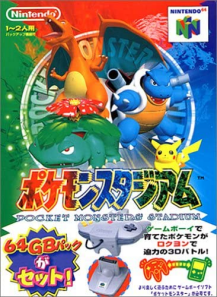 |
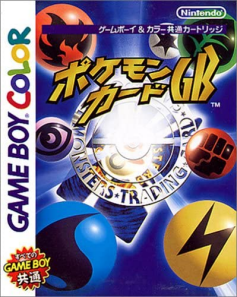 |
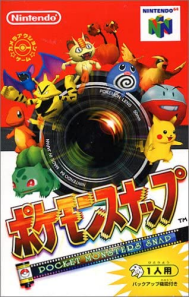 |
| Despite
having the name ポケモン in
all their
game titles the given English titles on their boxes all use the
unabbreviated
phrase Pocket Monsters. |
||
But then where were times when a third option was used.
| "Pockemon"
was actually the preferred romanization for a while |
Sometimes a company would feel brave and try their hand at writing the abbreviated word ポケモン out into English letters. And nine times out of ten, the spelling they chose was "Pockemon."
Below is a gallery of all the examples I've been able to find of the "Pockemon" spelling. Click on each image to view a larger version.
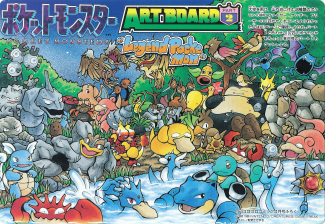 |
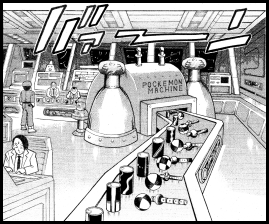 |
| A
"Legend
Pocke mon" art board included in the October 1996 issue of CoroCoro
Comics. Sometimes you would see the word "Pockemon" broken up with a
space in the
middle
to create "Pocke Mon." |
Panel
from the Kosaku Anakubo Pocket
Monsters chapter in the February 1997 issue of CoroCoro
Comics.
By around May 1999 or so the manga switched over to using the "Pokemon"
spelling. |
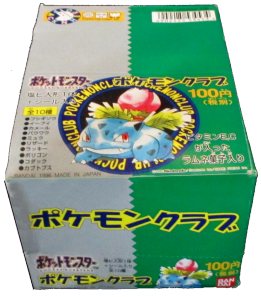 |
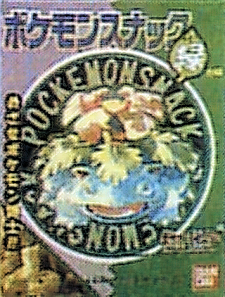 |
| "Pockemon
Club." Image from Mandarake. |
"Pockemon Snack" from Bandai |
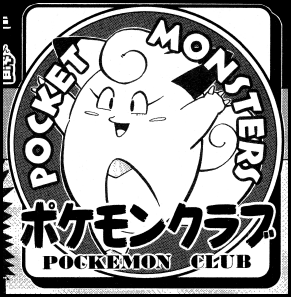 |
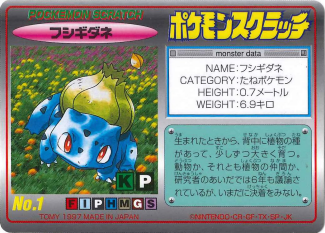 |
| The
logo for the "Pockemon Club" section of CoroCoro Comics. "Pockemon
Club" was a series of
articles that provided tips for playing the video games that ran from
September 1996 up until sometime in early 1999. |
Pockemon
Scratch, a series of cards released in May 1997. The "Pockemon"
spelling can be seen (barely) in the
green and red text
above the image of Fushigidane there. You can see more images here. |
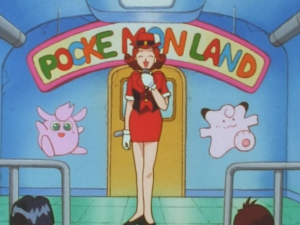 |
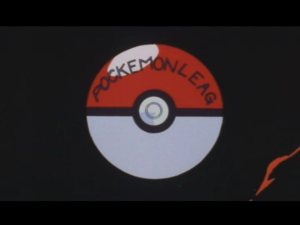 |
| Screenshot
from the July 22nd, 1997 episode of the
Pocket Monsters TV series "The Island of Giant Pokémon!?" This
shot was digitally
altered
for the
English dub. |
Screenshot
from the September
16th, 1997 episode of the Pocket Monsters TV series,
"Don't Get Mad,
Okorizaru!" This shot was left as-in in the dub. |
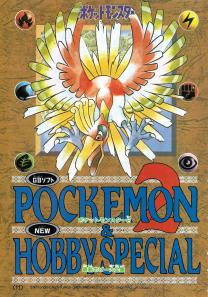 |
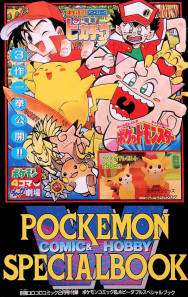 |
| Cover
of the Pocket Monsters Gold & Silver feature from the May 1997
issue of CoroCoro Comics. |
Special insert from the February 1998 issue of CoroCoro Special |
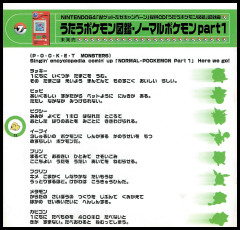 |
 |
| "NORMAL-POCKEMON Part 1" from the lyrics sheet for the song "Singing Pokémon Bestiary - Normal Pokémon Part 1." | "Pockemon
Crayon," a set of real world Pokémon-themed crayons you could
buy back in 1997. |
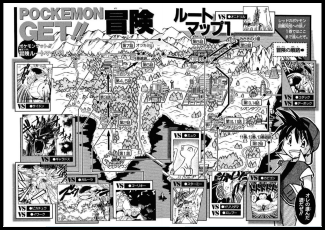 |
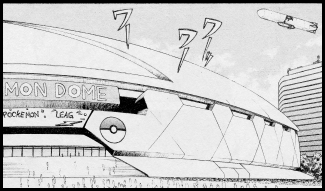 |
| The back of the first five volumes of Pocket Monsters Special manga featured a "Pockemon Get!!" section that shows off the Pokémon gotten in that volume. Volume Six swapped this out with a "Pockemon Battle!!" section. | Panel from the Toshihiro Ono Mewtwo Strikes Back manga adaptation from the July 1998 issue of CoroCoro Comics. |
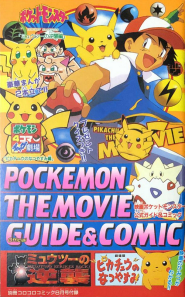 |
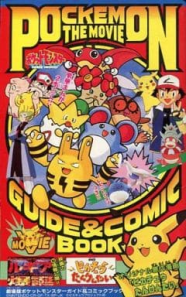 |
| Special
insert from the August 1998 issue of CoroCoro Special. Image from mercari. |
Special
insert from the August 1999 issue of CoroCoro Special. Image from Surugu-ya. |
Elsewhere in the world, this British gaming magazine from 1998 apparently opted to use the "Pockemon" spelling. This was before the franchise would make its English language debut later that year.
Now, the "Pokemon" spelling did sometimes appear here and there during this initial two-and-a-half-year period. It wasn't as common, but it wasn't unheard of, either.
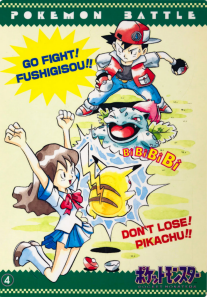 |
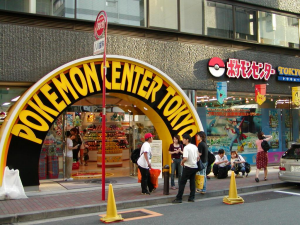 |
| A
Pokemon Carddass card from around December 1996. "Pokemon Battle" is
used instead of "Pockemon Battle." |
The
location of the first "Pokemon Center Tokyo" store in the Nijubashi
area of Tokyo. It opened on April 25th, 1998. |
But, for the most part, the "Pockemon" spelling seems to have been much more prevalent.
The TV series, meanwhile, just kind of did its own thing. In Episode 075 "The Curtain Rises on the Pokémon League! The Water Field!," for example, the show uses both the Pokémon and the Pockemon spellings with absolutely no regard for consistency.
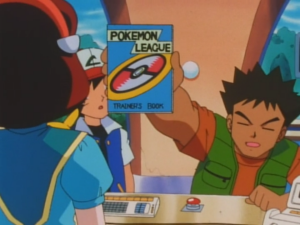 |
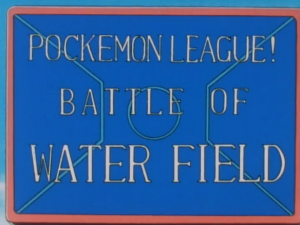 |
| "Pokémon
League" vs. "Pockemon League." The "Pockemon League" shot on the right was removed from the English dub. |
|
It is also worth noting that, during this time, we never, ever see the spelling with the accent over the "e." The "Pokémon" spelling wouldn't be seen until well after the franchise made its debut overseas.
| International
versions opt to use "Pokémon" |
When the franchise did eventually make its debut in the rest of the world, the "Pocket Monsters" naming got dropped entirely. You probably know this story already, but it was due to conflicts with the similarly named Monster in My Pocket. In this (archived) article posted on The Overtake, Joe Morrison, one half of the duo that created the Monster In My Pocket franchise, explains:

| “So
here is the background and it eventually ended up in litigation,”
Morrison tells me. The relationship between Pokémon and Monster
in My Pocket has a few legal twist and turns. Morrison implies that it
was Nintendo’s intention to call Pokémon “Pocket Monsters”, in
the West but that the similarity probably would have infringed on the
Monster copyright. Nintendo changed the name to Pokémon and
launched all the same. Morrison didn’t do much about it than grumble. He couldn’t afford to do anything about it until a licensing agent showed up with a proposal to distribute Monster in My Pocket with an upfront fee of three hundred thousand dollars. “Now I’m in the business, you don’t offer a lot of money like that for something that wasn’t out at the time. So I’m like ‘what’s going on here?’ And so I look through the proposal and at the end of the proposal there’s some little legal language that says we would never, ever go after Nintendo. Then I look into it, and it’s from a law firm in Seattle and it turns out the law firm is in the same building as Nintendo, and I say ‘wait a minute, these guys are obviously feeling some pressure’.” Sensing Nintendo might know they are crossing a line, Morrison took his claim that Pokemon was an infringement on the Monster franchise to court. He lost — “Our lawyer did an awful job”– and Nintendo tried to counter sue but the case was thrown out. |
So "Pocket Monsters" was off the table. So let's go for the abbreviated version of the name, right?
So at this point you might expect them to use the spelling most common in Japan, "Pockemon." But, of course, that's not what ended up happening at all. Nintendo of America opted for "Pokémon," a brand new, never-before-seen spelling of the word that removes the "c" and replaces the "e" with an accented "é."

The "é" was most likely added because if it wasn't there, most non-Japanese speakers would assume that the "e" is silent and that "Pokemon" was a two syllable word. Some people ended up thinking that anyway -- I'm sure we all have stories of an older relative referring to it as Pohk-mon at some point -- but in the end the accent did help a substantial number of fans realize that the word is supposed to be three syllables and not two.
But what about the loss of the "c"? One argument against the "Pocke" spelling is the existence of the word pokke (ポッケ), an abbreviation of the word "pocket" that's often used by caretakers when talking to young children. You can also see the spelling used for a brand of Yamaha bikes from the 1980s and as the name of a monkey character on the old NHK kids' show Ittemiyou Yattemiyou. One could argue that if Pocket Monsters' titular creatures were really meant to be written "Pockemon" then the original Japanese spelling would have been ポッケ モン, not ポケモン.
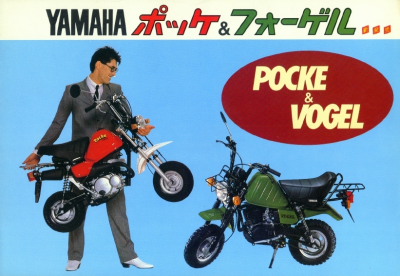 |
| Ad for
the Yama Pocke |
On the other hand, the Japanese word for "pager" is pokeberu (ポケベル), a word that most companies wrote out as "pocket bell" despite not using either the ポケット or ポッケ spelling.
Character space considerations may have also played a role. "Pokémon" is one letter less than "Pockemon," and while a one letter savings may not sound like a lot today a single letter could make a world of difference back in the 8-bit Game Boy days.
Whatever the reason(s) may be, the Pokémon spelling is what is currently recognized as the official, correct spelling of the characters featured in the Pocket Monsters series.
| Japan
switches over to using Pokémon as well |
Once the show made it to the West, Japan basically stopped using the "Pockemon" spelling altogether. The most recent example I could find was that CoroCoro Special insert booklet I mentioned above; from the summer of 1999 onwards, "Pokemon" took its place.
The first time I can find of Japan using the Americanized "Pokémon" (well, POKéMON) spelling was on the box art for Pokémon Pinball, a Game Boy Color game released in Japan on April 14th, 1999.

"Pokemon" and "Pokémon" would be used interchangeably for a few more years, but after a while even the "Pokemon" spelling would start to get phased out.
These days, we only ever see the Pokémon spelling in Japan. It makes a certain amount of sense; having a single name for your product in most countries makes a lot of sense, from a branding perspective. It's simpler to just have one spelling that's used throughout the world, right?
Still, it's interesting to think that there could have been a universe where the "Pockemon" spelling is the one we could have been using all these years!
Found an error? Spot an omission? Please help me keep this page current and error-free by e-mailing me with a description of the error or omission.

